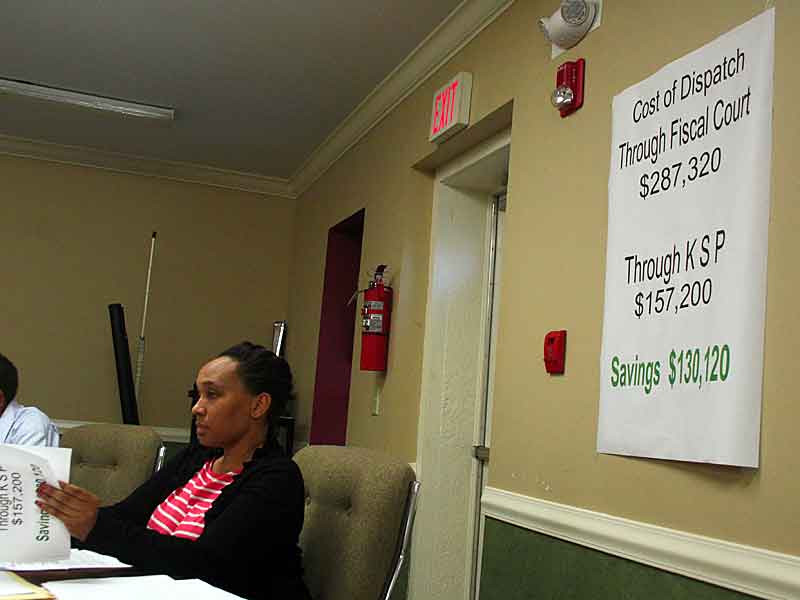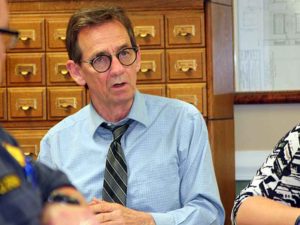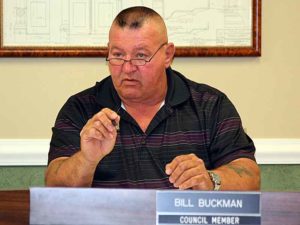Mayor calls dispatch decision ‘critical’ for safety of firefighters, police

This wall poster was also handed out to the council members to serve as a comparison of the costs for dispatch services by the joint city-county dispatch center versus the Kentucky State Police.
By JIM BROOKS
Nelson County Gazette / WBRT Radio
Wednesday, May 25, 2016, 10 p.m. — Calling it a critically important issue for the safety of city police and firefighters, Bardstown Mayor John Royalty asked the council at its meeting Tuesday to weight the benefits of having the Kentucky State Police provide city 911 dispatch services.
Larry Green, assistant city administrator, gave the council an overview of the anticipated costs for leaving the joint city-county dispatch service and having the KSP provide emergency dispatching services.

Larry Green, the city’s assistant administrator, explains the costs of KSP dispatch services during Tuesday’s city council meeting.
Nelson County Judge-Executive Dean Watts’ latest proposal to help fund the county dispatch service was to move the 911 landline fee from subscriber telephone bills to county residents’ garbage bills, Green said. The city and county would then split 60/40 the remaining costs to fund the dispatch center, with the city contributing 40 percent — or about $154,000.
The $2 fee on city customer garbage bills would raise approximately $133,000, which when added to the $154,000 means that city residents’ taxes or fees will amount to a total of $287,320.
“That’s how much it will cost for us to stay with Central Dispatch,” Green said. The $2 fee –which Green noted has not yet been approved by Nelson Fiscal Court — still means city residents would be asked to pay more than county residents, he said.
The annual estimated recurring cost for KSP 911 dispatching for city police and fire is $157,200, Green said.
In an earlier meeting, E-911 Dispatch Director Debbie Carter noted that the KSP’s initial estimate did not include the pro-rated share of the county’s 911 fees that KSP expects to receive if it takes over the city’s dispatching.
Carter said those fees are revenues KSP is counting on, and thus must be counted as a dispatch cost in order to determine the actual cost of KSP’s dispatching services.
Carter estimated the city’s share of the 911 fees would be between $40,000 to $60,000 annually. When added to KSP’s initial dispatch estimate, the cost for dispatching city police and fire increases to $200,000 or more annually.
The KSP’s estimate of one-time costs the city would need to pay did not initially include licensing fees for city police officer’s in-car mobile data terminals. The cost of those licenses pushed KSP’s estimate of the city’s one-time costs from $38,700 to about $50,000.
Green noted that if the city stays with Central Dispatch, it will need to pay a $50,000 licensing fee as well to Zuercher, the dispatch center’s new software provider.
In his comments during the meeting, Councilman Bill Buckman, who also chairs the safety committee, apologized for his earlier comments that were critical of the local E-911 dispatchers.
“I criticized the dispatchers themselves in the heat of the moment and I was wrong,” Buckman said. “I was wrong by doing it, they are good dispatchers.”
Buckman said his problem has always been with the dispatch system and communications. He said he believes local law enforcement plays second fiddle to the needs of Nelson County EMS. Dispatch can talk to EMS ambulances in downtown Louisville he said, while police officers have trouble talking to dispatch from across the parking lot.
“We’re playing second fiddle to EMS, and with the state police, we won’t,” he said.
Switching to KSP for dispatching will require about a two-to-three month transition period, he said. Officers would also have to revert back to the use of “10-codes” rather than “plain text,” Buckman said.
In the wake of the 9/11 terrorist attacks, the Federal Emergency Management Agency (FEMA) strongly encouraged police agencies to abandon the use of “10-codes” and instead use plain language in communications. The meanings of “10-codes” can vary widely from one agency to the next, and can become a barrier to communications between first-responders from different agencies.
The “10-codes” formerly used by the City of Bardstown generally match those used by KSP, according to the Radio Reference website.
City Attorney Tim Butler said that if the city wishes to place a $2 fee on garbage bills to help fund KSP dispatching, the council will need to act soon to enact the necessary legislation. The council also has the option of not creating any sort of fee and just pay for it from the city general fund as it has in the past.
Mayor John Royalty said that over a 10-year period the city could save as much as $1.3 million if it uses KSP’s dispatch services.
Green noted that if Nelson Fiscal Court would raise its 911 fee from $2 to $3, it would raise nearly enough revenue for the local dispatch center to be largely self-supporting.
One of the one-time costs that the city will incur regardless of who does its dispatching is installation of its own VHF repeater system at Bardstown City Hall, Royalty said.
The city fire department installed its own repeater system and the move improved its radio communications substantially, he said.
Royalty said the council needs to make a decision regarding dispatch.
“You have to decide do you want to save city taxpayers $130,000 year,” he said, calling it a critically important issue for the safety of city police and firefighters.
The council took no action, but will discuss it at its working session Tuesday, June 7.
-30-







